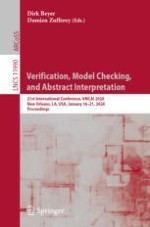2020 | OriginalPaper | Buchkapitel
How to Win First-Order Safety Games
verfasst von : Helmut Seidl, Christian Müller, Bernd Finkbeiner
Erschienen in: Verification, Model Checking, and Abstract Interpretation
Aktivieren Sie unsere intelligente Suche, um passende Fachinhalte oder Patente zu finden.
Wählen Sie Textabschnitte aus um mit Künstlicher Intelligenz passenden Patente zu finden. powered by
Markieren Sie Textabschnitte, um KI-gestützt weitere passende Inhalte zu finden. powered by
